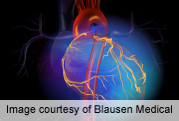
MONDAY, March 11 (HealthDay News) — Non-emergency coronary angioplasty is as safe and effective at hospitals with no on-site heart surgery services as it is at hospitals that have such services, according to a new study.
Coronary angioplasty is a procedure to clear blocked or narrowed heart arteries to restore blood flow to the heart.
Researchers compared outcomes among thousands of patients who underwent non-emergency angioplasty at 10 hospitals in Massachusetts without on-site heart surgery services and seven hospitals with on-site heart surgery services.
Rates of major heart-related problems — including repeat angioplasty, heart attack, stroke and death — were assessed at one month and one year after angioplasty. Rates at 30 days were 9.5 percent for hospitals without on-site heart surgery and 9.4 percent at hospitals with on-site heart surgery.
Rates at one year were 17.3 percent for hospitals without on-site heart surgery and 17.8 percent for those with on-site heart surgery, according to the study, which was to be presented Monday at the American College of Cardiology annual meeting in San Francisco.
The study also was published online March 11 in the New England Journal of Medicine.
The findings “suggest that performance of angioplasty in hospitals without cardiac surgery but with the appropriate experience, established angioplasty programs and the required hospital and operator volume, is an acceptable option for patients,” lead investigator Dr. Alice Jacobs, a professor of medicine at the Boston University School of Medicine, said in an American College of Cardiology news release.
Emergency surgery following angioplasty has become increasingly rare, the researchers said. They said this study adds to the growing body of evidence of good outcomes for patients who have elective or non-emergency angioplasty in hospitals without on-site heart surgery services.
The study was funded by the participating hospitals without on-site cardiac surgery service, the news release noted.
More information
The U.S. National Heart, Lung, and Blood Institute has more about angioplasty.

